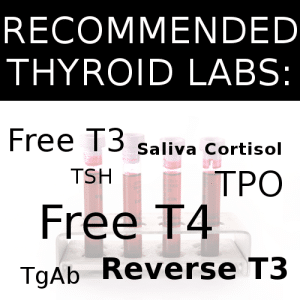Do you feel exhausted, have trouble losing weight, struggle with “brain fog”, suffer from anxiety or depression, feel cold all the time (especially your hands and feet), muscle weakness, joint pains, or have thinning hair? If so, you may have thyroid problem.
Undiagnosed thyroid problems have been running rampant for years and are the underlying cause of a wide variety of common ailments that doctors hear about every day in their practices. The Thyroid Federation International estimates there are up to 300 million people worldwide suffering from thyroid dysfunction yet over half are presumed to be unaware of their condition. Women are as much as 10 times as likely as men to have a thyroid problem due to the effects of their hormones on thyroid.
Why do Physicians Fail to Diagnose Hypothyroidism?
 Have you been told your labs are “normal”, but you have continuing symptoms? Being in the “normal range” has nothing to do with being optimal. Each of us is unique and our requirements for thyroid hormones and our reactions to imbalances are all unique. Different people can have different individual ranges ideal for them.
Have you been told your labs are “normal”, but you have continuing symptoms? Being in the “normal range” has nothing to do with being optimal. Each of us is unique and our requirements for thyroid hormones and our reactions to imbalances are all unique. Different people can have different individual ranges ideal for them.
According to mainstream medicine, TSH (thyroid stimulating hormone) is the gold standard for the diagnosis and treatment of thyroid dysfunction. Mainstream medicine relies solely on a normal TSH range from 0.5 to 4.5 (which is a HUGE range) despite a patient’s obvious hypothyroid symptoms. Further complicating matters is the fact that these labs do not test what happens to the thyroid hormones once they enter the cells of the body. Every cell of the body is dependent on thyroid hormones for proper functioning. There is no test that measures how well each cell is utilizing the thyroid hormone once it enters the cell. For these reasons you can have “normal” blood results but still be hypothyroid.
A great thyroid doctor is one that treats both the patient while evaluating the labs, not just a piece of paper. Unfortunately, most doctors resort to putting band-aids on the symptoms of hypothyroidism with antidepressants, anti-anxiety meds, statins, blood pressure meds, sleeping pills, or simply tell their patients to “exercise more & eat less”.
Properly Treating Hypothyroidism:
If you are able to convince a mainstream medicine doctor to treat your thyroid, they will prescribe pharmaceutical drugs such as Synthroid, Levoxyl, and Levothyroxine. These are synthetic forms of thyroid medication that only contain the inactive form of the thyroid hormone (T4). T4, also called thyroxine, is simply a storage hormone that has to be converted to T3 (the form that your body can use). If your body has difficulty converting the inactive T4 to the active T3, your symptoms will remain.
A healthy thyroid gland actually produces five hormones: T4, T3, T2, T1 and calcitonin. Not only are T4-only medications missing out on the active form of thyroid (T3) they are also missing out on the compliment of all five hormones.
Treating a patient with both T3 and T4, for example a natural desiccated thyroid such as NatureThroid, Armour Thyroid, or compounded thyroid, will supply the body with all the hormones needed for optimal function.
Hashimoto’s Disease is an auto-immune disease where the body has turned on itself and attacks and destroys its own thyroid gland. It is a leading cause of hypothyroidism, yet mainstream medicine fails to test patients for thyroid antibodies (Thyroid Peroxidase Antibodies (TPOAb) and Thyroglobulin Antibodies (TgAb).
Lab work is important, but relying solely on the broad range of a TSH test has led to millions of people undiagnosed. A comprehensive panel that includes at least the following needs to be used in combination with a thorough evaluation of symptoms and medical history.

Dr. David Derry of Canada was practicing medicine when the TSH lab was introduced, and he made the profound observation:
“The consensus of thyroidologists decided in 1973 that the TSH (lab) was the blood test they had been looking for all through the years. This was about two years after I started practice. Having been taught how to diagnose hypothyroid conditions clinically, I was in a position to watch to see what the relation of the TSH was to the onset of hypothyroidism. What I found was many people would develop classic signs and symptoms of hypothyroidism but the TSH was ever so slow to become abnormal, rise and confirm the clinical diagnosis. Sometimes it never did. Finally I began treating patients with hypothyroid in the normal manner I was taught. I could not see why I had to wait for the TSH to rise for me to be able to treat them.”
Do You Suspect You Have a Thyroid Disorder?
Healthy thyroid function is essential for almost every metabolic function in the body. If you have reason to believe yours is not working optimally, it makes sense to do some further investigating. Your body will thank you!
At the Dr. Shel Wellness & Aesthetic Center we offer free consultations to anyone who wants to have someone listen to their concerns and offer effective natural solutions to address the underlying cause of their symptoms.


















